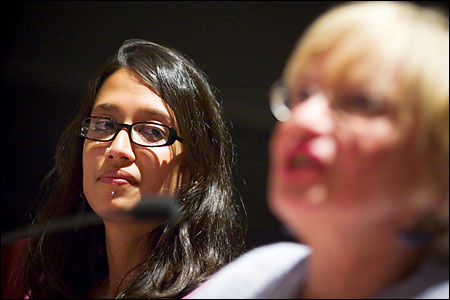Women astronomers detail struggles, triumph
Panel examines women in science

Faith Vilas’ hand was still smarting from the soldering iron burn she got fixing an astronomical instrument when the astronomer she was working with sat her down to talk about her future.
“He said,” Vilas recounted, “‘You make really good brownies. I recommend you go back to Boston and open a bakery.’”
Vilas, who takes over as the new director of the MMT Observatory near Tucson, Ariz., in December, recalled that the comment didn’t deter her desire to become an astronomer, but it did make her realize she needed to find others from whom to get recommendations for graduate school.
Not surprisingly, Vilas counted tenacity as one of the most valuable assets a woman entering the sciences today can possess. Vilas’ comments were echoed by other members of a Nov. 17 panel that discussed the experiences of women in science.
The panel, “The Challenges and Rewards for Women in Science,” featured Vilas; Andrea Dupree, senior astrophysicist at the Smithsonian Astrophysical Observatory; Kate Kirby, director of the Institute for Theoretical Atomic, Molecular, and Optical Physics at the Harvard-Smithsonian Center for Astrophysics (CfA); and Nitya Kallivayalil, graduate student in Harvard’s Astronomy Department. Jeno Sokoloski, National Science Foundation astronomy and astrophysics postdoctoral fellow at the CfA, moderated the event. The panel was sponsored by the CfA as part of its public Observatory Night series.
In addition to tenacity, panelists said that an excitement about their work is important in sustaining them in a field where, despite improvements in recent decades, women are still a minority.
“I think enthusiasm for the field is what will get you through the hard times,” said Dupree.
Each of the panelists described difficulties she’s had because of gender. Dupree said that as a postdoctoral fellow she had to bring complaints of wage inequity to several layers of management before her concerns were heard. Sokoloski described an isolating and intimidating atmosphere she faced as one of the very few female astrophysics graduate students at Princeton and Berkeley. Kallivayalil had a similar experience to Sokoloski, but faced the isolating environment in high school when there were mostly boys in her classes.
“My high school experience was killing my interest in going into physics, not because of a lost interest in physics, but because of the idea of going into a male-dominated environment,” Kallivayalil said. “The thought of having interactions for the rest of my life mainly with men was really a drag.”
Kallivayalil said what saved her was attending all-women’s Mount Holyoke College, which allowed her to pursue her interests without feeling isolated or like a minority. By the time she graduated, she said, she had gained enough confidence in herself and competence in the subject to better navigate the male-dominated field that awaited her.
Both Dupree and Vilas also attended an all-women’s school, Wellesley College, though they had different experiences. Dupree echoed Kallivayalil’s sense that not having to worry about whether fellow students were women or men was helpful, but Vilas said she chose Wellesley simply because it had a good astronomy department.
“The point is that you can do anything,” Dupree said. “There’s no sense that the president of the student government has to be a guy. Anything was open to you.”
Deciding to have children can affect one’s career path, the panelists said, but they added that it is possible to balance work and home. While at times difficult, several said they thought the difficulties worthwhile.
“Of course having children does affect your career; there’s only 24 hours in a day,” said Kirby, who has four children. “I think a lot of us who have children and careers feel that it’s part of what we want out of life, so you’ll make it work.”
Kirby said she had her first child when she was a graduate student at age 22. With her husband in medical school, she said it was a difficult time, but they managed – with the help of reliable day care.
“I still got my Ph.D. in four and a half years, but you work very, very hard,” Kirby said.
Despite changes in recent decades, the battle for equal treatment has to be fought every day even now. Dupree said there’s still work to be done to attain equality, as evidenced by the lack of women at astronomy’s highest levels. Kirby agreed, describing how she’s received programs for multiday astrophysical events that have not a single woman among their speakers. She said she’s spent a lot of time reminding people that this is unacceptable today and fighting to ensure women have a place at such events.
“Every time a woman points out a problem and change results, everyone benefits,” Kirby said.




